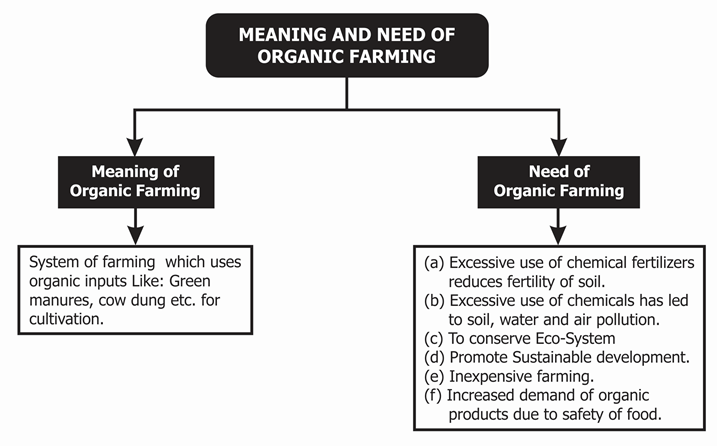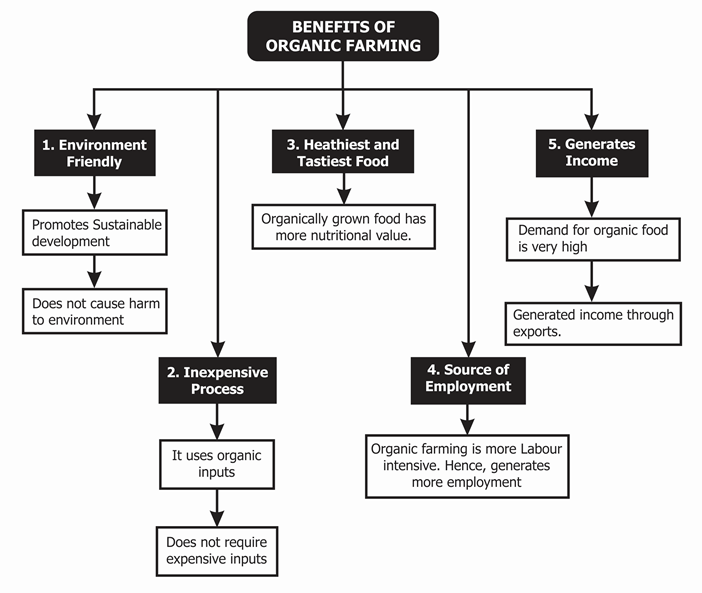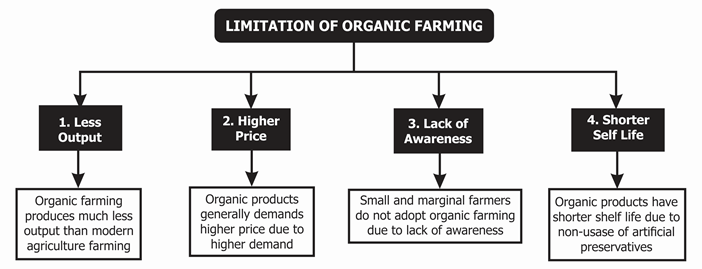Organic farming can be defined as an agricultural process that uses biological fertilisers and pest control acquired from animal or plant waste. Organic farming was actually initiated as an answer to the environmental sufferings caused by the use of chemical pesticides and synthetic fertilisers. In other words, organic farming is a new system of farming or agriculture that repairs, maintains, and improves the ecological balance.
Advantages of Organic Farming
Economical: In organic farming, no expensive fertilisers, pesticides, or HYV seeds are required for the plantation of crops. Therefore, there is no extra expense.
Good return on Investment: With the usage of cheaper and local inputs, a farmer can make a good return on investment.
High demand: There is a huge demand for organic products in India and across the globe, which generates more income through export.
Nutritional: As compared to chemical and fertiliser-utilised products, organic products are more nutritional, tasty, and good for health.
Environment-friendly: The farming of organic products is free of chemicals and fertilisers, so it does not harm the environment.
| You Might Also Like To Read: |
Disadvantages of Organic Farming
Incompetent: The major issue of organic farming is the lack of inadequate infrastructure and marketing of the product.
Less production: The products obtained through organic farming are less in the initial years as compared to that in chemical products. So, farmers find it difficult to accommodate large-scale production.
Shorter shelf life: Organic products have more flaws and a shorter shelf life than that of chemical products.
Limited production: Off-season crops are limited and have fewer options in organic farming.
Types of Organic Farming
Organic farming is divided into two types, namely:
- Integrated organic farming
- Pure organic farming
Pure organic farming means avoiding all unnatural chemicals. In this process of farming, all the fertilisers and pesticides are obtained from natural sources such as bone meal or blood meal.
Integrated organic farming includes the integration of pest management and nutrients management to achieve ecological requirements and demands.
Meaning and Importance of Organic Farming

Meaning of organic farming
System of farming that uses organic inputs like green manures, cow dung, etc., for cultivation.
Need of organic farming
- Excessive use of chemical fertilisers reduces the fertility of soil.
- Excessive use of chemicals has led to soil, water, and air pollution.
- To conserve ecosystem.
- To promote sustainable development.
- Inexpensive farming.
- Increased demand of organic products due to safety of food.
Benefits of Organic Farming

Benefits of organic farming
- Environment-friendly.
- Promotes sustainable development.
- Healthy and tasty food.
- Inexpensive process.
- It uses organic inputs.
- Generates income.
- Generates income through exports.
- Source of employment.
- Organic farming is more labour intensive. Hence, it generates more employment.
Limitations of Organic Farming

Limitations of organic farming
- Less output.
- Higher price.
- The lack of awareness.
- Organic products generally demand a higher price due to a higher demand.
- Shorter shelf life.
- Organic products have a shorter shelf life due to the absence of artificial preservatives.
The relevance of Organic Farming

Relevance of organic farming in India
- High nutritional value.
- Maximum profit.
- Employment opportunity.
| Important Topics in Economics: |
Stay tuned for questions papers, sample papers, syllabus, and relevant notifications on our website.
this is a short but very clear topic about organic farming.
Hi, thank you for making me a part of this educational link